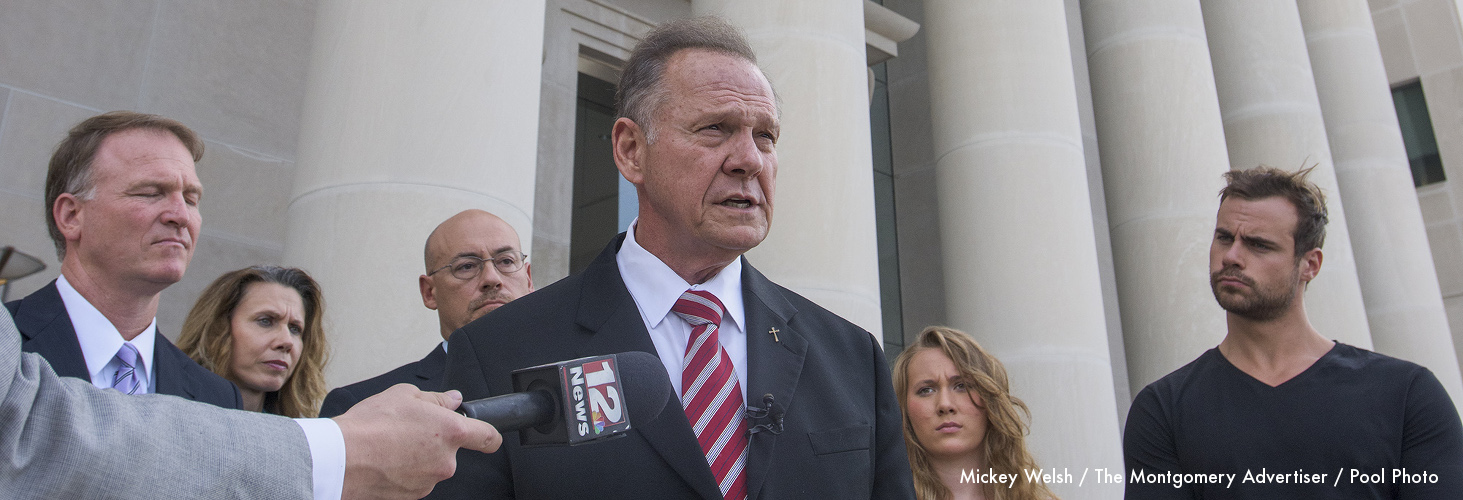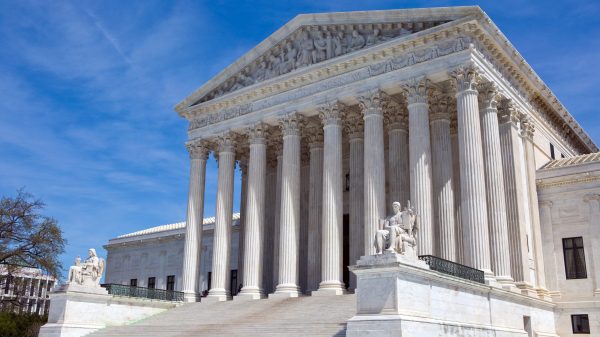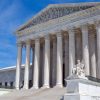By Brandon Moseley
Alabama Political Reporter
Tuesday, December 20, 2016, four amicus briefs have been filed on behalf of suspended Chief Justice Roy Moore (R), who is appealing his judicial suspension by the Court of the Judiciary (COJ) in September for the remainder of his term, which ends January 2019.
One brief was filed by the United States Justice Foundation. That brief states that it was improper to use Chief Justice Moore’s 2003 case as evidence of his intent to order probate judges to disregard federal orders in this case, and that the text of the Administrative Order at issue in this appeal does not support the COJ’s conclusions. They claim that the JIC did not meet its burden to establish Justice Moore’s guilt by clear and convincing evidence.
The second brief was from longtime Moore ally, Sanctity of Marriage Alabama. That brief makes the argument that the scope of the US Supreme Court’s authority to review certain matters has always been a matter of legitimate dispute and that it is a legitimate question as to whether the Supreme Court can automatically bind all states to its decisions, regardless of whether those states were parties to the case. It also argued that such questions are not the proper subjects of ethical decisions.
The brief argues that, “The attacks upon Chief Justice Moore because of his words and actions concerning same-sex marriage in Alabama and the probate judges, constitute an ideological and constitutional dispute, not an ethical dispute, and are therefore not a proper subject for action by the Judicial Inquiry Commission or the Court of the Judiciary.”
The spokesperson for Sanctity of Marriage Alabama, Tom Ford, said in a statement, “The members of the Special Court should acknowledge the elephant in the room and consider that the very fabric of our constitutional republic is at stake in the case of Chief Justice Roy Moore.”
Ford argued, “There has been a historic controversy over the scope of judicial review and the relationship of federal and state courts and while such controversy may at times be uncomfortable, there has been no recent crowning of the Judicial Inquiry Commission or the Southern Poverty Law as the final arbiter of such a controversy.”
Eight Alabama current and former trial court judges have filed an amicus brief in which they argued that the COJ’s attempt to avoid the unanimity requirement for removal under Rule 16 sets a dangerous precedent for disciplinary actions against judges in Alabama.
The judges are concerned that the case the JIC brought against Moore will serve as a precedent in future actions against other judges.
The judges argue that under current law, removing a judge requires a unanimous verdict by the Court of the Judiciary (COJ). The jurists argue that the lengthy suspension given to Chief Justice Moore is tantamount to removal and circumvents the purpose of the unanimous decision required by the COJ’s own rules for removal of a judge from office.
They also argue that the JIC did not comply with Rule Six, dealing with notice and investigations. Specifically, Moore’s defenders allege that someone at the JIC released information to the media prior to suspending the Chief Justice.
Finally the group of eight jurists claim that, “The severity of the punishment for the Chief Justice’s administrative speech in this particular case calls for modification by the appellate court lest judges misperceive that their judgement and the expression of that legal judgement must comport with a particular political and religious viewpoint, even when they state a valid, though arguable point of law.”
Judges Tim Riley, T. Lee Carter, John Bentley, Mark Hammitte, Ashley McKathan, Jerry Stokes, Rusty Johnston, and Frank L. McGuire, III all signed the amicus curiae. The group are represented by Winthrop E. Johnson.
The fourth brief was filed by attorney Richard Lawrence, who argues that the U.S. Supreme Court did not have subject matter jurisdiction to decide Obergefell v. Hodges and that the jurisdictional question needed to be addressed. The brief argued that the Chief Justice’s Administrative Order merely recognized that the Alabama Supreme Court could have addressed this issue, which he believes was an open question at the time of the Administrative Order.
Chief Justice Moore is being represented by Liberty Counsel. Liberty Counsel Founder and Chairman, Mat Staver, said, “These four amicus briefs continue to validate the trumped-up charges against Chief Justice Roy Moore. Chief Justice did nothing wrong and should be reinstated immediately so he can serve the people who elected him.”
The JIC’s handling of this case has been widely criticized and a number of Republican legislators have proposed legislation to change how the Alabama Judicial Inquiry Commission operates and limit its powers.
Meanwhile Chief Justice Roy Moore was one of several people interviewed by Alabama Governor Robert Bentley (R) for a possible appointment to the US Senate, if Senator Jeff Sessions is confirmed as the next US Attorney General. Moore received the highest amount of support for the position from the 500 plus members of the Alabama Republican Executive Committee.
Alabama Attorney General Luther Strange (R) has already announced his intention to run for the US Senate seat in the special election. If Moore and Strange are both running in the special election for Senate, and if Gov. Bentley sets it in the Gubernatorial election in 2018, that potentially could remove both of the two top polling Republican candidates for Governor in 2018.
Other candidates mulling a possible GOP gubernatorial run are: Senate Pro Tem. Del Marsh (R-Anniston), Alabama Commissioner of Agriculture and Industries John McMillan (R), state Auditor Jim Zeigler, and Jefferson County Commissioner David Carrington (R). Alabama House Minority Leader Craig Ford (D-Gadsden) is reportedly also considering a run for Governor. Marriage equality activist Bruce Countryman has already announced that he is running for Governor. Marijuana activist Ron Crumpton has announced that he is running for US Senate.





















































